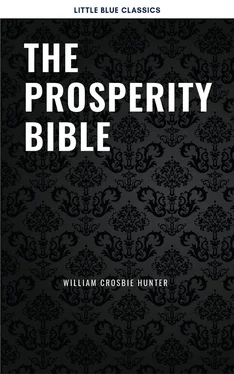19
INFLUENCING BY EXPOSITION
Speak not at all, in any wise, till you have somewhat to speak; care not for the reward of your speaking, but simply and with undivided mind for the truth of your speaking.
—Thomas Carlyle, Essay on
Biography .
A complete discussion of the rhetorical structure of public speeches requires a fuller treatise than can be undertaken in a work of this nature, yet in this chapter, and in the succeeding ones on "Description," "Narration," "Argument," and "Pleading," the underlying principles are given and explained as fully as need be for a working knowledge, and adequate book references are given for those who would perfect themselves in rhetorical art.
The Nature of Exposition
In the word "expose"— to lay bare, to uncover, to show the true inwardness of —we see the foundation-idea of "Exposition." It is the clear and precise setting forth of what the subject really is—it is explanation.
Exposition does not draw a picture, for that would be description. To tell in exact terms what the automobile is, to name its characteristic parts and explain their workings, would be exposition; so would an explanation of the nature of "fear." But to create a mental image of a particular automobile, with its glistening body, graceful lines, and great speed, would be description; and so would a picturing of fear acting on the emotions of a child at night. Exposition and description often intermingle and overlap, but fundamentally they are distinct. Their differences will be touched upon again in the chapter on "Description."
Exposition furthermore does not include an account of how events happened—that is narration. When Peary lectured on his polar discoveries he explained the instruments used for determining latitude and longitude—that was exposition. In picturing his equipment he used description. In telling of his adventures day by day he employed narration. In supporting some of his contentions he used argument. Yet he mingled all these forms throughout the lecture.
Neither does exposition deal with reasons and inferences—that is the field of argument. A series of connected statements intended to convince a prospective buyer that one automobile is better than another, or proofs that the appeal to fear is a wrong method of discipline, would not be exposition. The plain facts as set forth in expository speaking or writing are nearly always the basis of argument, yet the processes are not one. True, the statement of a single significant fact without the addition of one other word may be convincing, but a moment's thought will show that the inference, which completes a chain of reasoning, is made in the mind of the hearer and presupposes other facts held in consideration.
In like manner, it is obvious that the field of persuasion is not open to exposition, for exposition is entirely an intellectual process, with no emotional element.
The Importance of Exposition
The importance of exposition in public speech is precisely the importance of setting forth a matter so plainly that it cannot be misunderstood.
"To master the process of exposition is to become a clear thinker. 'I know, when you do not ask me,' replied a gentleman upon being requested to define a highly complex idea. Now some large concepts defy explicit definition; but no mind should take refuge behind such exceptions, for where definition fails, other forms succeed. Sometimes we feel confident that we have perfect mastery of an idea, but when the time comes to express it, the clearness becomes a haze. Exposition, then, is the test of clear understanding. To speak effectively you must be able to see your subject clearly and comprehensively, and to make your audience see it as you do."
There are pitfalls on both sides of this path. To explain too little will leave your audience in doubt as to what you mean. It is useless to argue a question if it is not perfectly clear just what is meant by the question. Have you never come to a blind lane in conversation by finding that you were talking of one aspect of a matter while your friend was thinking of another? If two do not agree in their definitions of a Musician, it is useless to dispute over a certain man's right to claim the title.
On the other side of the path lies the abyss of tediously explaining too much. That offends because it impresses the hearers that you either do not respect their intelligence or are trying to blow a breeze into a tornado. Carefully estimate the probable knowledge of your audience, both in general and of the particular point you are explaining. In trying to simplify, it is fatal to "sillify." To explain more than is needed for the purposes of your argument or appeal is to waste energy all around. In your efforts to be explicit do not press exposition to the extent of dulness—the confines are not far distant and you may arrive before you know it.
Some Purposes of Exposition
From what has been said it ought to be clear that, primarily, exposition weaves a cord of understanding between you and your audience. It lays, furthermore, a foundation of fact on which to build later statements, arguments, and appeals. In scientific and purely "information" speeches exposition may exist by itself and for itself, as in a lecture on biology, or on psychology; but in the vast majority of cases it is used to accompany and prepare the way for the other forms of discourse.
Clearness, precision, accuracy, unity, truth, and necessity—these must be the constant standards by which you test the efficiency of your expositions, and, indeed, that of every explanatory statement. This dictum should be written on your brain in letters most plain. And let this apply not alone to the purposes of exposition but in equal measure to your use of the
Methods of Exposition
The various ways along which a speaker may proceed in exposition are likely to touch each other now and then, and even when they do not meet and actually overlap they run so nearly parallel that the roads are sometimes distinct rather in theory than in any more practical respect.
Definition, the primary expository method, is a statement of precise limits. Obviously, here the greatest care must be exercised that the terms of definition should not themselves demand too much definition; that the language should be concise and clear; and that the definition should neither exclude nor include too much. The following is a simple example:
To expound is to set forth the nature, the significance, the characteristics, and the bearing of an idea or a group of ideas.
–Arlo Bates, Talks on Writing English .
Contrast and Antithesis are often used effectively to amplify definition, as in this sentence, which immediately follows the above-cited definition:
Exposition therefore differs from Description in that it deals directly with the meaning or intent of its subject instead of with its appearance.
This antithesis forms an expansion of the definition, and as such it might have been still further extended. In fact, this is a frequent practise in public speech, where the minds of the hearers often ask for reiteration and expanded statement to help them grasp a subject in its several aspects. This is the very heart of exposition—to amplify and clarify all the terms by which a matter is defined.
Example is another method of amplifying a definition or of expounding an idea more fully. The following sentences immediately succeed Mr. Bates's definition and contrast just quoted:
A good deal which we are accustomed inexactly to call description is really exposition. Suppose that your small boy wishes to know how an engine works, and should say: "Please describe the steam-engine to me." If you insist on taking his words literally—and are willing to run the risk of his indignation at being wilfully misunderstood—you will to the best of your ability picture to him this familiarly wonderful machine. If you explain it to him, you are not describing but expounding it.
Читать дальше












